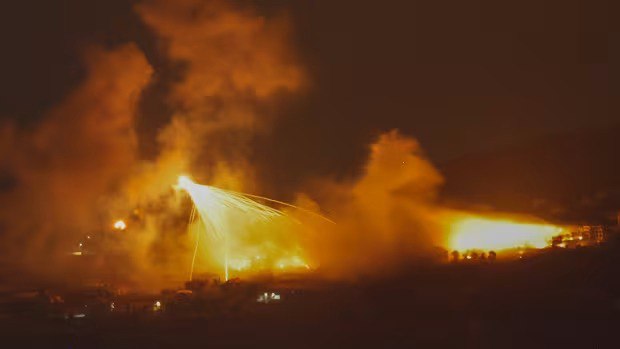Israel’s troops entered Lebanon on Tuesday as part of what the Israeli military called a “limited, localized and targeted” ground operation aimed at dismantling Hezbollah command structures and weapons sites.
The operation follows almost a year of near-daily Hezbollah missile attacks on northern Israel, which the Iran-backed group launched in the immediate aftermath of its ally Hamas’ Oct. 7, 2023, attacks on Israel.
Israel over the last year has been firing back on Hezbollah positions in Lebanon. Its ground invasion follows its detonation of booby-trapped pagers and walkie-talkies used by Hezbollah members, two weeks of airstrikes in Lebanon that have killed more than 1,000 people, and its killing of Hezbollah’s leader Hassan Nasrallah.
‘Tremendous blow to Hezbollah’:Hezbollah leader Nasrallah dies in Israeli strike, upending region
Israel says its latest assault is intended to make sure that about 60,000 displaced residents of Israel’s northern areas can safety return to their homes. But it also represents an escalation of a long-simmering conflict in the Middle East between Israel and Iran-backed groups in the region. These groups − Hezbollah in Lebanon, Houthi rebels in Yemen and various militias in Iraq − have rallied behind Hamas after the latter killed 1,200 people and took about 250 hostages back to the Gaza Strip during its attacks on communities in southern Israel last year.
It was not immediately clear what Israel meant by a “limited, localized and targeted” invasion. Israel says Hezbollah has a large network of tunnels and weapons storage facilities in southern Lebanon.
Hezbollah was formed in 1982 with backing from Iran’s newly formed Islamic Republic to pressure Tehran’s arch-enemy Israel. It is sometimes described as a state within a state in Lebanon. Its heavily armed militia has political representation in Lebanon’s parliament and enjoys support as a social movement in the country.
However, Lebanon itself has historically stayed on the sidelines of a major conflicts with Israel. It did so in 2006 when Israel fought its last major war with Hezbollah, and again in 1982, when Israel invaded Lebanon and laid siege to Beirut to attack the Palestinian Liberation Organization, most of whose surviving members are now part of Fatah, a political group that maintains limited administrative control over parts of the West Bank, a Palestinian territory.
Lebanon’s Prime Minister Najib Makati nevertheless said his country is facing “one of its most dangerous phases.” He said about one million people have been displaced since Israel’s assaults began last month. In Gaza, where Israel launched a massive assault on Hamas after its Oct. 7 attacks, most of the Palestinian enclave’s 2.3 million people have been displaced. More than 41,300 Palestinians have been killed, according to the Gaza health ministry.
The White House and the U.S. State Department did not immediately respond to a request for comment on Israel’s ground operations in Lebanon, but on Monday, President Joe Biden called for a cease-fire.
“I’m more worried than you might know and I’m comfortable with them stopping,” Biden told reporters when asked if he was comfortable with Israeli plans for a cross-border incursion. “We should have a cease-fire now.”
Biden said the U.S. would send a “few thousand” more troops to the Middle East. The Pentagon said these troops would bolster security for the 40,000 U.S. troops already in the region and help with the defense of Israel.
Israel last week rejected a proposal by the U.S. and France calling for a 21-day cease-fire on the Lebanon border to give time for a diplomatic settlement that would allow displaced civilians on both sides to return home.

